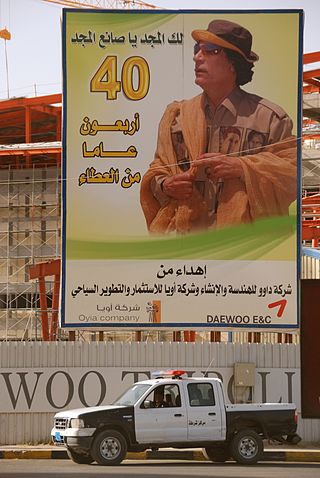This article relies largely or entirely on a single source .(July 2017) |
| |||||
| Decades: | |||||
|---|---|---|---|---|---|
| See also: | Other events of 1979 List of years in Libya | ||||
The following lists events that happened in 1979 in Libya .
This article relies largely or entirely on a single source .(July 2017) |
| |||||
| Decades: | |||||
|---|---|---|---|---|---|
| See also: | Other events of 1979 List of years in Libya | ||||
The following lists events that happened in 1979 in Libya .

The politics of Libya has been in an uncertain state since the collapse of the Libyan Arab Jamahiriya in 2011 and a recent civil war and various jihadists and tribal elements controlling parts of the country.

Muammar Muhammad Abu Minyar al-Gaddafi was a Libyan revolutionary, politician and political theorist who ruled Libya from 1969 until his assassination by rebel forces in 2011. He came to power through a military coup, first becoming Revolutionary Chairman of the Libyan Arab Republic from 1969 to 1977 and then the 'Brotherly Leader' of the Great Socialist People's Libyan Arab Jamahiriya from 1977 to 2011. Initially ideologically committed to Arab nationalism and Nasserism, Gaddafi later ruled according to his own Third International Theory.

The Third International Theory, also known as the Third Universal Theory and Gaddafism, was the style of government proposed by Muammar Gaddafi on 15 April 1973 in his Zuwara speech, on which his government, the Great Socialist People's Libyan Arab Jamahiriya, was officially based. It combined elements of Arab nationalism, Nasserism, Anti-imperialism, Islamic socialism, left-wing populism, African nationalism, Pan-Arabism, and it was partly influenced by the principles of direct democracy. Another source that the Gaddafi draws from is Islamic fundamentalism; he opposed formal instruction in the meaning of the Qur'an as blasphemous and argued that Muslims had strayed too far from God and the Qur'an. However, Gaddafi's regime has been described as Islamist, rather than fundamentalist, for he opposed Salafism, and many Islamic fundamentalists were imprisoned during his rule.

Human rights in Libya is the record of human rights upheld and violated in various stages of Libya's history. The Kingdom of Libya, from 1951 to 1969, was heavily influenced by the British and Y.R.K companies. Under the King, Libya had a constitution. The kingdom, however, was marked by a feudal regime. Due to the previous colonial regime, Libya had a low literacy rate of 10%, a low life expectancy of 57 years, with many people living in shanties and tents. Illiteracy and homelessness were chronic problems during this era, when iron shacks dotted many urban centres in the country.

Muammar Gaddafi became the de facto leader of Libya on 1 September 1969 after leading a group of young Libyan Army officers against King Idris I in a bloodless coup d'état. After the king had fled the country, the Revolutionary Command Council (RCC) headed by Gaddafi abolished the monarchy and the old constitution and established the Libyan Arab Republic, with the motto "freedom, socialism and unity". The name of Libya was changed several times during Gaddafi's tenure as leader. From 1969 to 1977, the name was the Libyan Arab Republic. In 1977, the name was changed to Socialist People's Libyan Arab Jamahiriya. Jamahiriya was a term coined by Gaddafi, usually translated as "state of the masses". The country was renamed again in 1986 as the Great Socialist People's Libyan Arab Jamahiriya, after the United States bombing that year.

Abdul Ati al-Obeidi was a Libyan politician and diplomat. He held various top posts in Libya under Muammar Gaddafi; he was Prime Minister from 1977 to 1979 and General Secretary of General People's Congress from 1979 to 1981. He was one of three main negotiators in Libya's decision to denounce and drop their nuclear weapons program.

Abdessalam Jalloud is a Libyan former politician and military officer who served as the Prime Minister of Libya from 16 July 1972 to 2 March 1977, under the government of Muammar Gaddafi. He was also Minister of Treasury from 1970 until 1972.

The Revolutionary Command Council was a twelve-member governing body that ruled the Libyan Arab Republic after the 1969 Libyan coup d'état by the Free Officers Movement, which overthrew the Senussi monarchy of King Idris I. The council's chairman was Muammar Gaddafi, who had the most influence and served as Libya's de facto head of state as Revolutionary Chairman of the Libyan Arab Republic and commander-in-chief of the armed forces. It was ideologically Arab nationalist, republican, anti-imperialist and pan-Arabist.

Moussa Muhammad El-Haj Nemr Koussa is a Libyan political figure and diplomat, who held several high-profile positions in the Libyan government, lastly as Minister of Foreign Affairs from March 2009, into the Libyan Civil War, when he resigned his position on 30 March 2011.

The Libyan civil war, also known as the First Libyan Civil War, was an armed conflict in 2011 in the North African country of Libya that was fought between forces loyal to Colonel Muammar Gaddafi and rebel groups that were seeking to oust his government. The war was preceded by protests in Zawiya on 8 August 2009 and finally ignited by protests in Benghazi beginning on Tuesday 15 February 2011, which led to clashes with security forces who fired on the crowd. The protests escalated into a rebellion that spread across the country, with the forces opposing Gaddafi establishing an interim governing body, the National Transitional Council.

The National Transitional Council (NTC) was a transitional government established in the 2011 Libyan civil war. The rebel forces overthrew the Libyan Arab Jamahiriya of Muammar Gaddafi. The NTC governed Libya for a period of ten months after the end of the war, holding elections to a General National Congress on 7 July 2012, and handing power to the newly elected assembly on 8 August.
Huda Ben Amer is a former Libyan politician. A follower of the Libyan ruler, Colonel Muammar Gaddafi, she was the Secretary of the General People's Congress of Inspection People's Control and mayor of Benghazi until the Libyan Civil War.
Iman al-Obeidi is a former Libyan postgraduate law student who received worldwide media attention during the Libyan Civil War. This was because she burst into the restaurant of the Rixos Hotel in Tripoli and told the international press corps there that Libyan troops had beaten and gang-raped her. Her public statement challenged both the Gaddafi government and the taboo against discussing sex crimes in Libya.

The Brotherly Leader and Guide of the Revolution of the Great Socialist People's Libyan Arab Jamahiriya was a title held by former Libyan leader Muammar Gaddafi, who claimed to be merely a symbolic figurehead of the country's official governance structure. However, critics long described him as a dictator, referring to his position as the de facto former political office, despite the Libyan state's denial of him holding any power.

From 1969 to 2011, the politics of Libya were determined de facto by Muammar Gaddafi, who had been in power since his overthrow of the Kingdom of Libya in 1969.

Kosovo's declaration of independence from Serbia was enacted on Sunday, 17 February 2008 by a unanimous vote of the Assembly of Kosovo without popular referendum. All 11 representatives of the Serb minority boycotted the proceedings. International reaction was mixed, and the world community continues to be divided on the issue of the international recognition of Kosovo. Libya extended official diplomatic recognition to Kosovo on 25 September 2013. Serbian president Aleksandar Vučić announced in 2023 that Libya has withdrawn recognition of Kosovo.
The Cultural Revolution in Libya was a nearly four-year period of political and social change in Libya. It started with Muammar Gaddafi's declaration of a cultural revolution during a speech in Zuwara on 15 April 1973. This came after increasing tensions between Gaddafi and his colleagues in the Revolutionary Command Council (RCC) had led him to agree to step down. Gaddafi had told the RCC that he would announce his resignation to the people during his Zuwara speech, but he instead surprised them with his declaration of the Cultural Revolution. By the end of the Cultural Revolution period, Gaddafi was the uncontested leader of Libya.
The following lists events that happened in 1978 in Libya.
The following lists events that happened in 1977 in Libya.

The 40th anniversary of the Libyan Revolution was a ruby jubilee anniversary in the Great Socialist People's Libyan Arab Jamahiriya celebrated on 1 September 2009 in honor of the 1969 Libyan coup d'état.